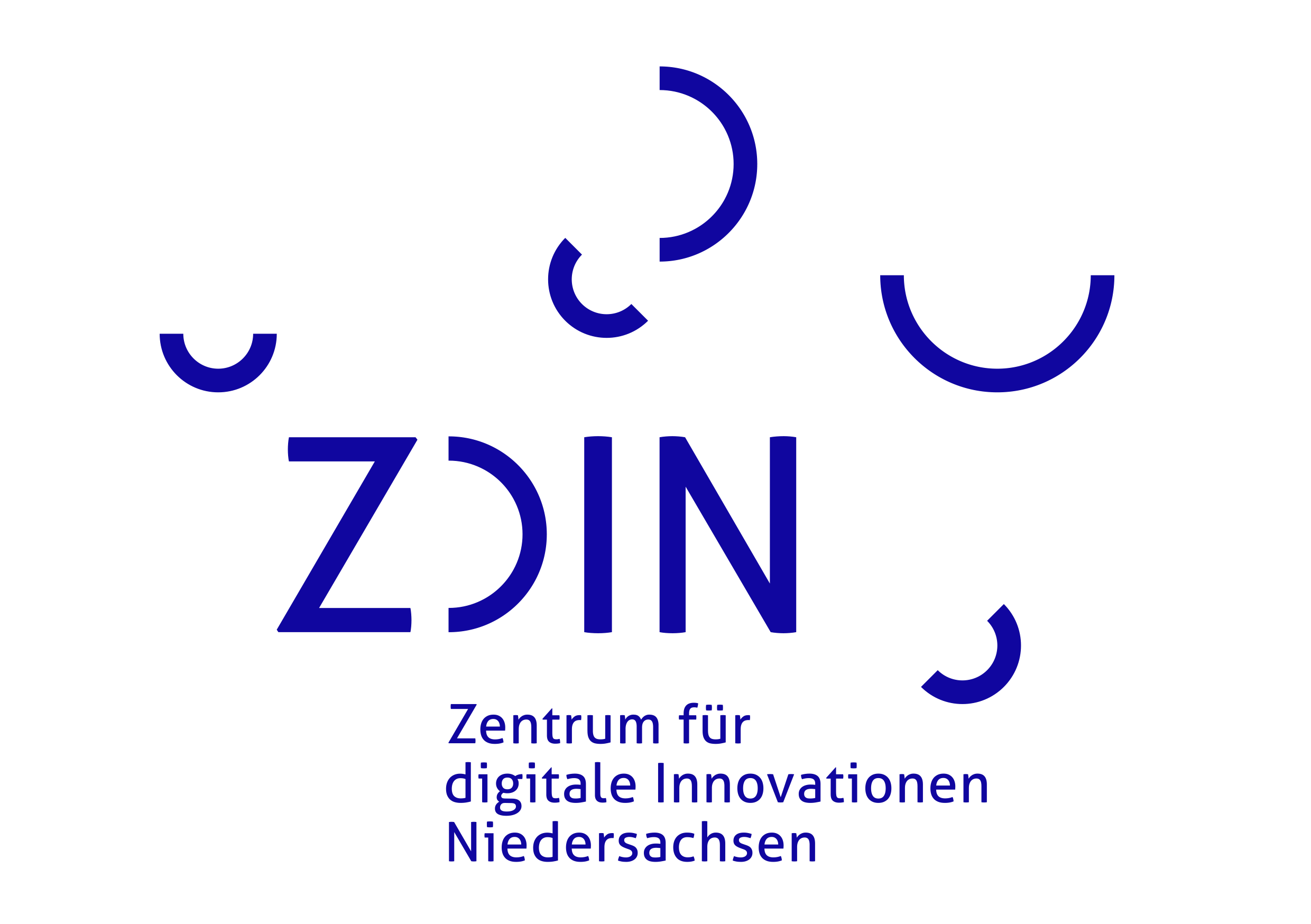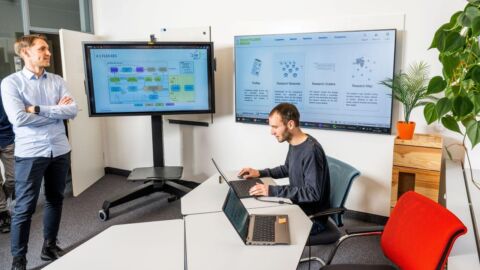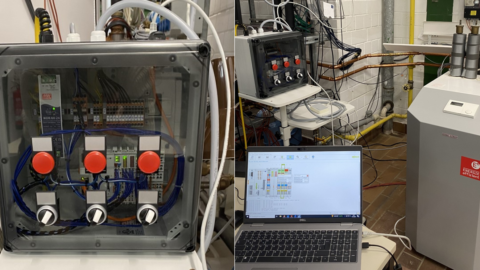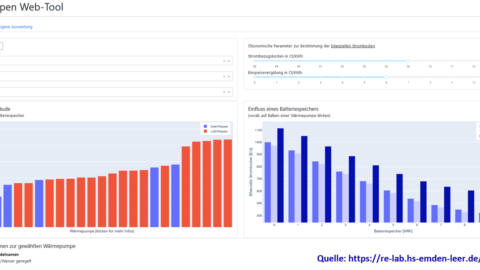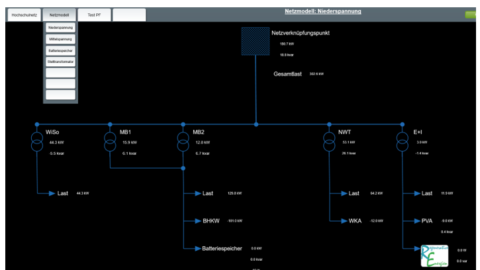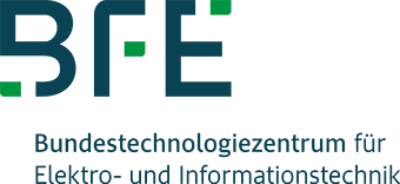Zukunftslabor Energie
Die Digitalisierung spielt in Energiesystemen und für die Energiewende eine bedeutende Rolle. Sie unterstützt beziehungsweise ermöglicht die Erfassung, Überwachung, Kommunikation, Analyse und Optimierung von Messwerten sowie die (Fern-)Steuerung dezentraler Energieumwandlungsanlagen und Betriebsmittel für eine effizientere Betriebsführung, die sich weitgehend automatisiert an die hochdynamisch veränderlichen Prozesse der Energiewirtschaft anpasst. Ein mehrere Sektoren wie Strom, Gas oder Wärme integrierendes Energiesystem schafft einerseits Flexibilität, um auf die Prognoseunsicherheit dezentraler, dargebotsabhängiger Energieeinspeisung reagieren zu können. Gleichzeitig erhöht es die Systemkomplexität drastisch – mit Auswirkungen auf Modellierung und Steuerung. Neben einem Verständnis für neue Wechselwirkungsdynamiken in einem integrierten Energie- und Informationssystem sind zum Teil völlig neue Ansätze zur Analyse und Optimierung dieses Cyber-Physical-Energy-System-of-Systems erforderlich.
Zentrale Aspekte des Zukunftslabors Energie sind maschinelles Lernen und Big Data Analytik in Energiesystemen, cyber-resiliente Energiesysteme und Informationssicherheit, Informations- und Kommunikationstechnologie-basierte Integration neuer Akteure in die System- und Einsatzplanung von dezentralen Energieanlagen sowie Interoperabilität und standardisierte Prozesse multimodaler Energiesysteme.


Wissenschaftler*innen

Sarah Fayed
Sarah Fayed ist wissenschaftliche Mitarbeiterin im Labor Regenerative Energien an der Hochschule Emden/Leer, Fachbereich Elektrotechnik/Informatik. Ihre Forschungsschwerpunkte sind: elektrische Netzsimulationen, Energiedatenanalyse- und Prognosen.
Projekte
Entwicklung einer Plattform für die Erforschung digitalisierter Energiesysteme mit dem Ziel, die Energiesystemforschung und -entwicklung zu digitalisieren
Untersuchung kritischer Wechselwirkungen, Konflikte, Herausforderungen und Risiken zwischen Informations- und Kommunikationstechnoloigien und der Versorgungsinfrastruktur in digitalisierten Energiesystemen

Sarah K. Lier
Sarah K. Lier ist wissenschaftliche Mitarbeiterin am Institut für Wirtschaftsinformatik an der Leibniz Universität Hannover. Ihre Forschungsschwerpunkte sind erklärbare und ethische künstliche Intelligenz und erneuerbare Energiesysteme.
Projekte
Untersuchung kritischer Wechselwirkungen, Konflikte, Herausforderungen und Risiken zwischen Informations- und Kommunikationstechnoloigien und der Versorgungsinfrastruktur in digitalisierten Energiesystemen
Entwicklung einer Plattform für die Erforschung digitalisierter Energiesysteme mit dem Ziel, die Energiesystemforschung und -entwicklung zu digitalisieren
Systemdienstleistungen für sichere Stromnetze in Zeiten fortschreitender Energiewende und digitaler Transformation für Anpassung an veränderten Anforderungen

Luca Manzek
Luca Manzek ist wissenschaftlicher Mitarbeiter in der Abteilung Energie, in der Gruppe "Entwurf und Bewertung standardisierter Systeme", an dem OFFIS Institut in Oldenburg.
Projekte
Entwicklung einer Plattform für die Erforschung digitalisierter Energiesysteme mit dem Ziel, die Energiesystemforschung und -entwicklung zu digitalisieren

Annika Ofenloch
Annika Ofenloch ist wissenschaftliche Mitarbeiterin in der Abteilung Co-Simulation multimodaler Energiesysteme am OFFIS Institut für Informatik. Zu ihren Forschungsinteressen gehören die Modellierung und simulative Untersuchung digitalisierter Energiesysteme.
Projekte
Entwicklung einer Plattform für die Erforschung digitalisierter Energiesysteme mit dem Ziel, die Energiesystemforschung und -entwicklung zu digitalisieren
Untersuchung kritischer Wechselwirkungen, Konflikte, Herausforderungen und Risiken zwischen Informations- und Kommunikationstechnoloigien und der Versorgungsinfrastruktur in digitalisierten Energiesystemen

Fernando Andres Penaherrera Vaca
Fernando Andreas Penaherrera Vaca ist wissenschaftlicher Mitarbeiter in der Abteilung Energie, in der Gruppe "Energy Efficient Smart Cities", an der OFFIS Institut in Oldenburg. Seine Forschungsschwerpunkte sind die Modellierung von Energiesystemen und deren Komponenten in hochintegrierten Quartieren.info@zdin.de
Projekte
Implementierung des Smart City Konzeptes, für ein klimaneutraleres Quartier, auf dem Gelände des stillgelegten Reallabors Fliegerhorst in Oldenburg
Entwicklung einer Plattform für die Erforschung digitalisierter Energiesysteme mit dem Ziel, die Energiesystemforschung und -entwicklung zu digitalisieren
Untersuchung kritischer Wechselwirkungen, Konflikte, Herausforderungen und Risiken zwischen Informations- und Kommunikationstechnoloigien und der Versorgungsinfrastruktur in digitalisierten Energiesystemen

Jan Petznik
Jan Petznik ist Projekt- und Laborleiter in der Abteilung Energiesystemtechnologie am Institut für Vernetzte Energiesysteme am Deutschen Zentrums für Luft und Raumfahrt in Oldenburg. Seine Forschungsschwerpunkte liegen in den Bereichen elektrische Energiesysteme, Sektorenkopplung, Co-Simulation und Laborkopplung
Projekte
Untersuchung kritischer Wechselwirkungen, Konflikte, Herausforderungen und Risiken zwischen Informations- und Kommunikationstechnoloigien und der Versorgungsinfrastruktur in digitalisierten Energiesystemen

Dr. Ing. Sven Rosinger
Dr-Ing. Sven Rosinger ist Forschungsgruppenleiter im Bereich Energie am OFFIS. Seine Forschungsschwerpunkte sind: Technologien für energieeffiziente Smart Cities, Mehrwertdienste auf Basis von Smart Meter Gateways.
Projekte
Durch Digitalisierung die Umsetzung von Wärmewende- und Mehrwertanwendungen für Gebäude, Campus, Quartiere und Kommunen im Nordwesten zu fördern.
Implementierung des Smart City Konzeptes, für ein klimaneutraleres Quartier, auf dem Gelände des stillgelegten Reallabors Fliegerhorst in Oldenburg

Alejandro Rubio
Alejandro Rubio ist wissenschaftlicher Mitarbeiter am Deutschen Zentrum für Luft- und Raumfahrt e. V. (DLR), Institut für Vernetzte Energiesysteme / Seine Forschungsschwerpunkte sind: Betrieb und Resilienz elektrischer Netze und die Simulation und Optimierung von Energiesysteme.
Projekte
Untersuchung kritischer Wechselwirkungen, Konflikte, Herausforderungen und Risiken zwischen Informations- und Kommunikationstechnoloigien und der Versorgungsinfrastruktur in digitalisierten Energiesystemen

Ihsan Ünal
Ihsan Ünal ist wissenschaftlicher Mitarbeiter am Institut für energieoptimierte Systeme (EOS) an der Ostfalia Hochschule für angewandte Wissenschaften. Seine Forschungsschwerpunkte sind die Entwicklung und Integration von Gebäudemodellen sowie die Optimierung von Verfahren zur Nachhaltigkeitsbewertung.
Projekte
Untersuchung kritischer Wechselwirkungen, Konflikte, Herausforderungen und Risiken zwischen Informations- und Kommunikationstechnoloigien und der Versorgungsinfrastruktur in digitalisierten Energiesystemen

Henrik Wagner
Henrik Wagner ist wissenschaftlicher Mitarbeiter am elenia Institut für Hochspannungstechnik und Energiesysteme an der TU Braunschweig. Seine Forschungsschwerpunkte sind: Simultane Mehrfachnutzung von häuslichen Batteriespeichersystemen, Netzaufnahmefähigkeit von Quartieren für Elektromobilität, Betreibermodelle für Quartiere und EE-Gemeinschaften.
Projekte
Entwicklung einer Plattform für die Erforschung digitalisierter Energiesysteme mit dem Ziel, die Energiesystemforschung und -entwicklung zu digitalisieren
Untersuchung kritischer Wechselwirkungen, Konflikte, Herausforderungen und Risiken zwischen Informations- und Kommunikationstechnoloigien und der Versorgungsinfrastruktur in digitalisierten Energiesystemen
Geförderte Einrichtungen
Projekte des Zukunftslabors
News
Videos und Podcasts
Wissenschaftliche Veröffentlichungen
While traditional cybersecurity approaches effectively address static or well-known threats, they often struggle to keep pace with the rapidly evolving threat landscape. New research highlights that i ...
While traditional cybersecurity approaches effectively address static or well-known threats, they often struggle to keep pace with the rapidly evolving threat landscape. New research highlights that increasing sophistication and dynamism in cyberattacks require adaptive and proactive measures, such as artificial intelligence (AI) applications and services, to complement conventional methods. AI for cybersecurity is needed to respond efficiently and reliably to threats and attacks, to detect dynamic threats faster, to analyze more precisely, and to enable adaptive protective measures that outperform conventional approaches. We identified research needs for AI in cybersecurity that need to be addressed by implementing respective AI applications and services. Companies and organizations need further research and company-centric approaches. We address AI for cybersecurity through a literature review and semi-structured expert interviews in a design science research–oriented framework. We identify typical implementation steps, deduce critical process phases, and develop a new process model to successfully implement AI for cybersecurity, including five process phases and 19 process steps. Our iterative five-phase process model provides a structured framework that is flexible to adapt to specific and general requirements, focuses on iterative evaluations; addresses cost, functional requirements, certifications, and environmental impact; facilitates early risk identification; and strengthens resilience against cyberattacks. Furthermore, we deduce seven key performance indicators to support a quantitative assessment of AI’s efficiency and effectiveness, allow benchmarking, and develop best practices. Finally, we provide limitations and a further research agenda.
Autor*innen
- Sarah K. Lier (Leibniz Universität Hannover)
- Prof. Dr. rer. nat. habil. Michael H. Breitner (Leibniz Universität Hannover, Institut für Wirtschaftsinformatik)
Veröffentlichung
- Im Rahmen des Buches/Journals bzw. Konferenz: Electronic Markets
- Datum: 19.06.2025
- Link zur Veröffentlichung
Energy research software (ERS) is a central cornerstone to facilitate energy research. However, ERS is developed by researchers who, in many cases, lack formal training in software engineering. This r ...
Energy research software (ERS) is a central cornerstone to facilitate energy research. However, ERS is developed by researchers who, in many cases, lack formal training in software engineering. This reduces the quality of ERS, leading to limited reproducibility and reusability. To address these issues, we developed ten central recommendations for the development of ERS, covering areas such as conceptualization, development, testing, and publication of ERS. The recommendations are based on the outcomes of two workshops with a diverse group of energy researchers and aim to improve the awareness of research software engineering in the energy domain. The recommendations should enhance the quality of ERS and, therefore, the reproducibility of energy research.
Autor*innen
- M. Sc. Stephan Ferenz (Carl von Ossietzky Universität Oldenburg, Department für Informatik)
- M. Sc. Emilie Frost (Carl von Ossietzky Universität Oldenburg, Abteilung für Digitalisierte Energiesysteme)
- M. Sc. Rico Schrage (Carl von Ossietzky Universität Oldenburg, Abteilung für Digitalisierte Energiesysteme)
- M.Sc. Thomas Wolgast (OFFIS Institut für Informatik)
- Inga Beyers
- Oliver Karras
- M.Sc. Oliver Werth (Leibniz Universität Hannover, Institut für Wirtschaftsinformatik)
- Prof. Dr.-Ing. Astrid Nieße (Carl von Ossietzky Universität Oldenburg, Abteilung für Digitalisierte Energiesysteme)
Veröffentlichung
- Im Rahmen des Buches/Journals bzw. Konferenz: 16th ACM International Conference on Future and Sustainable Energy Systems (E-Energy '25)
- Datum: 17.06.2025
- Link zur Veröffentlichung
Cooperative algorithmic-level decompositions are a parallel computation method that executes several local algorithms. These local algorithms in turn exchange information to find better or more robust ...
Cooperative algorithmic-level decompositions are a parallel computation method that executes several local algorithms. These local algorithms in turn exchange information to find better or more robust solutions. In energy management, this paradigm is used for multi-agent systems to manage generation and/or consumption of electric power within coalitions of energy resources. The exchanged data contains operational schedules of other group members. Such data can be aggregated and exploited by agents to find better solutions and derive sensitive information. It is thus desirable to keep the data private. We apply the Paillier cryptosystem to the use case of distributed predictive scheduling in virtual power plants or energy districts. We had to extend the interaction protocol as simply securing the communication channel between the agents is not targeted for this type of algorithm. Calculations of the global objective function are now done as a joint distributed task with homomorphic encryption. We show that the privacy version has a competitive performance in terms of solution quality with only a constant increase in message exchange for larger scenarios.
Autor*innen
- Dr. Jörg Bremer
- Prof. Dr. Sebastian Lehnhoff (Carl von Ossietzky Universität Oldenburg, Abteilung Energieinformatik)
Veröffentlichung
- Im Rahmen des Buches/Journals bzw. Konferenz: Proceedings of the 16th ACM International Conference on Future and Sustainable Energy Systems
- Datum: 17.06.2025
- Link zur Veröffentlichung
Wissenschaftliche Vorträge
Referent*innen
- Sarah K. Lier (Leibniz Universität Hannover)
- Prof. Dr. rer. nat. habil. Michael H. Breitner (Leibniz Universität Hannover, Institut für Wirtschaftsinformatik)
Vortrag
- Im Rahmen der Veranstaltung: Visios4AI
- Datum: 22.09.2025
Referent*innen
- Yifan Wang
- Sarah K. Lier (Leibniz Universität Hannover)
- Prof. Dr. rer. nat. habil. Michael H. Breitner (Leibniz Universität Hannover, Institut für Wirtschaftsinformatik)
Vortrag
- Im Rahmen der Veranstaltung: Visios4AI
- Datum: 22.09.2025
Referent*innen
- Fernando Andres Penaherrera Vaca (OFFIS Institut für Informatik, FuE-Bereich Energie)
Vortrag
- Im Rahmen der Veranstaltung: Circular Economy for the Energy Transition, Summer School, Padova University
- Datum: 04.07.2025

